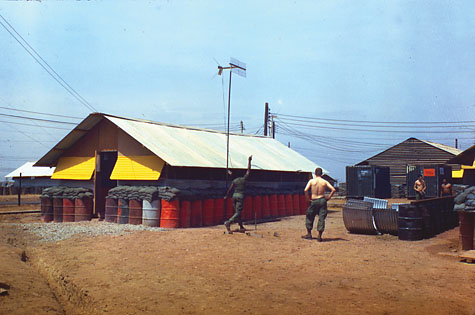 |
||||||||||||
|
AGENT ORANGE: THE TOXIC BATTLEFIELD COMES HOME, May/June 2012
THE PLEASURES OF SHOWERING IN BY DAVID WILLSON
The memo went on to warn that it was especially dangerous to shower in the dark in these units: Unfriendly creatures might lie in wait to nibble on the tender parts of soldiers. The memo ended with the threat of an automatic Article 15 for anyone caught shaving in a shower unit. There would be security inspections after dark of random shower units. What a friendly reception those folks will get, I thought. I don’t recall that Alfred Hitchcock’s Psycho was mentioned, but the image of Janet Leigh in the shower appeared in my head and stuck there. It occurred to me during every Long Binh shower I took thereafter—with me as Janet Leigh, an incongruous and darkly comic image, but scary, too. It so happened that I was one of those soldiers who often showered after dark. I worked long hours, so often it was dark before I had the opportunity to visit a shower unit. In the evening there was no crush or line for showering. I’d strip down to my olive drab boxers; carry my ditty bag containing a bar of Ivory soap, some shampoo, and a razor; and head out in my flip-flops across the boardwalk over a sea of red laterite mud that was between me and the shower unit of my choice. Oh, I also threw a stiff, none-too-well-laundered olive drab towel over one shoulder and carried with me a fresh, clean pair of OD boxers.
Another reason I preferred to shower in the late evening was that the water was more likely to be warmish. I didn’t demand a hot shower. I would have been out of luck if I had. I had heard that in a far corner of the compound there were hot showers, but I never walked that far. I think some engineer group had set them up. But I was happy enough with a warmish shower. No matter how hot the day, I didn’t want a cold shower. The water was provided in an ingenious arrangement, similar to what I’d encountered a few years earlier when I was a Boy Scout attending BSA gatherings. In that version, a platform was erected of tree limbs of substantial size and in the crux at the top there was placed a 55-gallon drum filled with water. A hole in the side had a hose coming out of it and there was a sprinkler on the end of the hose. There was some canvas wrapped around near the half-way point, but privacy was at a premium. Another method was the same sort of tree limb set-up but with a large water-filled canvas bag with a hose. The U.S. Army outdid the BSA. We got to shower in real buildings, brand new ones. There were several barrels on top of these solid little wooden structures. The barrels were brightly colored, often in a festive orange. Not the expected OD. After we received the terrifying memo about the dangers of showering, most of us scoffed and continued to shower and shave as had been our habit. I suppose a few soldiers gave up showering as too darned risky, not something they wanted to do to make their return home to the Land of the Big PX less likely. Not me, though. I persisted in my nightly shower. When I arrived at the shower unit after my journey on the boardwalk, I entered the little building, felt around for the hooks on the wall of the unit, and hung up my towel, clean boxers, and ditty bag. I removed my OD boxers of the day and put them on the bench that was next to the door. I then found the toggle switch and turned on the water, if water there was. It took some time, but usually water began with a trickle and then, if I was lucky, a flood of water came out of the shower nozzle. I had no idea how long it would continue, so I grabbed my shampoo and got going right away. More than once I’d gotten my head lathered, then the water quit. But usually the water was warmish and plentiful. It made me happy to have all of this water coursing down my six-foot frame to wash my 138-pound body. After I’d shampooed and rinsed, I lathered up my face, got out my razor, and shaved by touch. I’d gotten good at that. That took only a couple of minutes. I was always glad to be rid of the whiskers, sparse as they were. I never thought about it at the time, but the water left the building through slats in the floor and went out into the red laterite soil that surrounded that building and all the other buildings in the compound. I also tuned out the ever-present smell of mildew, which was a major part of living in Vietnam. I did not think much about the possibility of spiders, snakes, and scorpions or other tropical denizens, but I never was barefoot. The flip-flops gave me the illusion of safety. I do not remember ever having to share the shower with anyone else. I only remember being alone in the building, alone with my thoughts, and alone with the water. I remember my eyes stinging from the water, but at the time I figured that was due to the shampoo being washed out of my hair and onto my face. That was enough of an explanation at the time. I didn’t spend long in the shower—five minutes was my limit. I turned off the toggle switch, grabbed my crusty towel, and dried myself. I climbed into my clean boxers, rolled up my old ones in the towel, and put my stuff back in the ditty bag. I then returned to my barracks via the boardwalk. After my shower and shave, I’d sometimes get dressed and amble down to the mess hall to eat a late-night dinner of ham, escalloped potatoes, and green beans cooked with bacon. This was a meal I loved—lucky for me, as it was the same late-night dinner served every night. I loved the big slab of hot ham, slathered in red gravy. The potatoes were cheesy and crisp on top, and the green beans had been cooked for hours with bacon. There was plenty of Kool-Aid to wash the dinner down. Actually the mess hall drink was Jell-O mixed with Long Binh water pumped from the water table and lots of ice. I drank gallons of the stuff. Sometime in the ’90s, I read a different memo warning of the dangers of showering at Long Binh. This memo failed to mention razor blades or nocturnal interlopers. This memo was all about the dangers of the warmish water that had coursed down my young body. Now that I thought about it, the water did often have an odd smell. Sort of medicinal or chemical, and sometimes oily. This memo mentioned the orange barrels and talked about an herbicide nicknamed Agent Orange by the military folks who had dumped it out of the sky onto the green landscape of South Vietnam. The barrels containing the herbicides had been reused by the ever-frugal Army to contain and dispense water to us at Long Binh. They took no great care to clean the barrels as it was well-known that the stuff only harmed trees and not people. Above the little shower units were placed hundreds of these barrels into which was pumped the defoliant-soaked water of Long Binh. The water sat in the barrels much of the long day, cooking in the hot Vietnam sun, awaiting the eager victims who queued up to take turns being exposed to a premier cancer risk. Test results about dioxins causing cancer had long been known to scientists and to the company that marketed the stuff to the Army. In fact, they had told the Army. But the Army was busy thinking about stopping the spread of communism. Or something. The showers got our exteriors. The Kool-Aid got us from the inside. This second memo made me think of my grandfather, who served in the Army in the Philippines in 1910. “If the SOBs don’t get you coming, they will get you going,” he often said. So what does a guy do when he gets a memo that the rest of his life is unlikely to be endless vacations to Kauai, wind surfing, hiking, or even veranda sitting, watching frolicking sea turtles? You do what you can. You try to make the most of the time you have left, whatever that may be, with the people you love. You savor the moment. You try to avoid being consumed by bitterness about all the lies you’ve been fed. You put one foot in front of the other, as long as you have the mobility to do so. You soldier on. David Willson’s “REMF Diary of Dying and Bureaucratic Complexity,” which details his struggles to cope with life-threatening, AO-related multiple myeloma, appeared in the November/December 2009 issue of The VVA Veteran.
|
||||||||||||
 |
||||||||||||
 |
||||||||||||
| |
||||||||||||
|
||||||||||||
8719 Colesville Road, Suite 100, Silver Spring. MD 20910 | www.vva.org | contact us |
||||||||||||







 A MACV memo arrived on my desk in the USARV Inspector General Office where I was working in the fall of 1967. It warned of a serious danger: Soldiers were shaving in the shower units and then discarding their used razor blades. Several soldiers had incurred serious injuries—in one case a life-threatening injury—getting tangled up with the blades. Some blades had been stuck between the 2x4s used in the construction of these tiny frame buildings. The memo even suggested that careless soldiers were unknowingly doing the work of Viet Cong infiltrators.
A MACV memo arrived on my desk in the USARV Inspector General Office where I was working in the fall of 1967. It warned of a serious danger: Soldiers were shaving in the shower units and then discarding their used razor blades. Several soldiers had incurred serious injuries—in one case a life-threatening injury—getting tangled up with the blades. Some blades had been stuck between the 2x4s used in the construction of these tiny frame buildings. The memo even suggested that careless soldiers were unknowingly doing the work of Viet Cong infiltrators. 